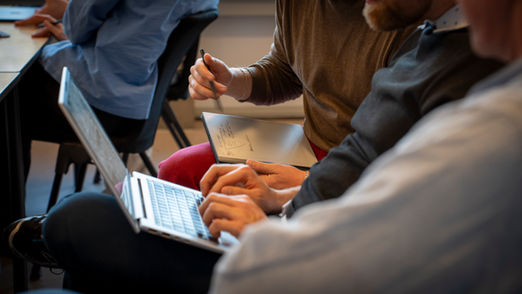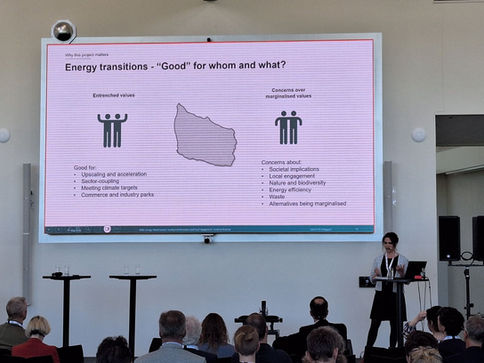Activities
Workshop held at Baltic Energy Island Summit
At the Baltic Energy Island Summit, the members of Good-by-devicing held the first of four workshops. Here the participants being mainly technically-oriented experts were asked the to engage with energy islands, listing all the instruments and tools that go into the orchestration of this big ‘system of systems’ that makes up an energy island. The workshop had a succesful turnout and we wish to thank everyone for participating. To learn more about the workshop, you may read this short article with our initial reflections.
Photo credits: Jesper Westley
Communication Training
Members of Good-by-devicing - Daniel, Emil, Tom, and Julia - were joined by Rebekka Nordal Thomsen and Julius Kob from Julia's Sapere Aude project Expertise of Expectations for a communication workshop conducted by SPHERE communications November 2025. The articulated aim was to develop a shared narrative and lay the groundwork for a strategic communication plan in the respective projects as well as across. These efforts are part and parcel in consolidating a strong focus on STS studies of energy at the Science and Technology section at DTU Management.
Scientific Advisory Board 2025
The second meeting of the Scientific Advisory Board took place at the Technical University of Denmark on September 15–16, 2025, in a hybrid format. The program included two presentations from board members and structured discussions on the progress of the individual work packages as well as the overall project. Participants also visited Powerlab DK, where professor Jacob Østergaard gave a presentation focusing on various Bornholm-related data measurement campaigns.
Energy Issue Map
The Danish Energy Islands Issue Atlas was co-funded by the Good-By-Devicing project & ECHO Lab at DTU Management and was assembled in collaboration with students from the Polytechnic foundation courses in Science, Technology, and Society at DTU. The Atlas was designed by Ainoa Pubill and Sarah Feldes, together with Mathieu Jacomy, Anders Kristian Munk, Julia Kirch Kirkegaard, Tom Cronin, Emil Nissen, Sebastian Husted and Daniel Nordstrand Frantzen.
All associated resources are available through this Github page.
Professor Julia Kirch Kirkegaard: Good energy – Struggles valuing energy transitions in Denmark Climate change and its consequences have led to calls for accelerating and upscaling renewable energy developments. Yet, these advances and changes to existing energy infrastructures often produce controversy and bring with them unforeseen consequences of their own. These controversies are tied to questions of what is ‘good’ and what counts as ‘good energy’. Key to understanding this are the tools, devices, and expertise that have been used in the design of our energy future. After introducing the state-of-the-art on valuation struggles over the energy transition, the lecture sets out a new research direction, pointing towards a ‘sociology of devicing’, to critically probe the (often invisible) role of devices in valuing what kind of energy future should come to count. Empirical examples used are wind energy, energy islands, and Power-to-X Julia Kirch Kirkegaard is professor of Social Studies of Energy, and focusses particularly on energy transition controversies.
Inaugural Lecture
At the joint professorial inaugural lecture on 6th March 2025 Julia Kirch Kirkegaard and Anders Kristian Munk talked about the valuation struggles and controversies that new technologies sometimes create, how we can learn more about them, and from there create a better connection between technology and society.
Watch the lecture here or read more about the two lectures of the day below.
Professor Anders Kristian Munk: Mapping technological problems in society Technologies have always had the potential to change our lives. It is therefore natural that technology is something we discuss in society. Different people with different interests and values look differently on consequences, potentials, risks, and ethics. It has never been more important to understand these differences. We live in a time where the pace of technological development and the complexity of the societal challenges it is meant to address make it difficult to grasp which actors are raising which questions and with what consequences. We need continuous and updated knowledge about technologies as wicked problems in society to understand, navigate, and prioritize the way we engage with techno-scientific controversies. In his inaugural lecture, Anders Kristian Munk talks about the mapping of these controversies and the opportunities currently created by data science and machine learning for a field of research that has traditionally been qualitatively oriented. Anders Kristian Munk is a professor in computational anthropology and focuses especially on large language models and their challenges and potentials as research instruments.
Scientific Advisory Board 2024
The first Scientific Advisory Board was held in Rungstedgaard in a hybrid manner on November 20th - 22nd 2024 . Here, the visiting board members gave presentations from their fields of expertise respectively and gave feedback to presentations from Julia Kirch Kirkegaard, Tom Cronin, Kristoffer Marslev, and Emil Nissen. The meeting also featured a visit to the contemporary exhibition "Ocean" at Louisiana, Humlebæk that sparked lively discussions amongst the participants.
Presentation and panel debate
Konference om lokal inddragelse og opbakning til VE i det åbne land, 11th June 2024
Arranged by Danish Energy Agency
"Fremtidens lokale grønne omstilling"
Panel debate, Folkemødet, Bornholm 13th June 2024
Arranged by Centre for Regional and Tourism Research. Resultater fra den seneste forskning om opbakning og modstand i forbindelse med VE-projekter, inklusive refleksioner om hvordan den grønne omstilling kan medvirke til at styrke lokalsamfundene i fokus
Presentation for session at the Baltic Energy Island Summit, Bornholm, 7th May 2024
How can the transformation of energy island communities be supported while preserving their unique qualities and how can local communities be involved and empowered?
















